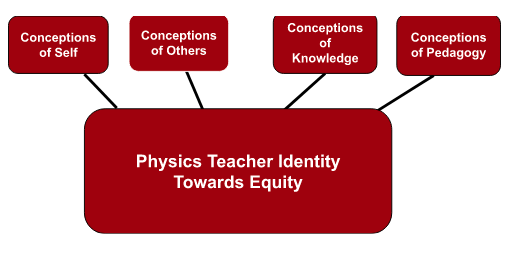In the realm of physics education, the notion of equitable instruction takes on multiple perspectives, engaging scholars, teacher educators, and in-service teachers alike. Our research explores physics teachers’ conceptions of equitable instruction, drawing inspiration from Ladson-Billings’ (1995) culturally relevant theoretical framework. Within this framework, she identified three main conceptions shaping successful teaching practices for African American students: self and others, social relations, and knowledge. Building upon this foundation, our novel framework explores four distinct dimensions of physics teacher identity towards equity: conceptions of self, others, knowledge, and pedagogy.

The first domain, “Conceptions of self,” delves into how teachers perceive their own ability to foster equitable learning experiences for their students. Influenced by diverse demographic factors like race, class, gender, and sexuality, this conception encompasses teachers’ views on effective teaching strategies, interactions with students, collaborations with colleagues and supervisors, parent engagement, and support provided to students’ learning journeys.
The second domain, “Conceptions of others,” focuses on teachers’ perspectives of their students and how these perceptions influence their approaches to equitable instruction. Acknowledging the impact of structural issues that marginalize specific communities, teachers with empathetic conceptions of their students may cultivate inclusive classroom practices and behaviors.
In the third domain, “Conceptions of knowledge,” we explore how physics teachers view and understand the subject matter. This aspect plays a pivotal role in shaping their instructional practices. Teachers’ conceptions of knowledge can either facilitate or hinder student learning, encompassing critical elements such as problematizing traditional physics canon and questioning the sources of knowledge.
To investigate physics teacher identity more comprehensively, this project employs in-depth interviews with secondary and university instructors. Through qualitative and quantitative data analyses, we uncover teachers’ key conceptions of equity in both a deductive and inductive approach. Our intended outcome is to develop a deeper understanding of how physics teacher identities intersect with instructional practices and student engagement, thereby informing future projects aimed at enhancing the inclusivity and effectiveness of physics education. This collaborative research effort involves Maria Horak, Maya Patel, Delwrick Nanthou, and Clausell Mathis, combining expertise and perspectives to comprehensively explore equitable instruction in physics.